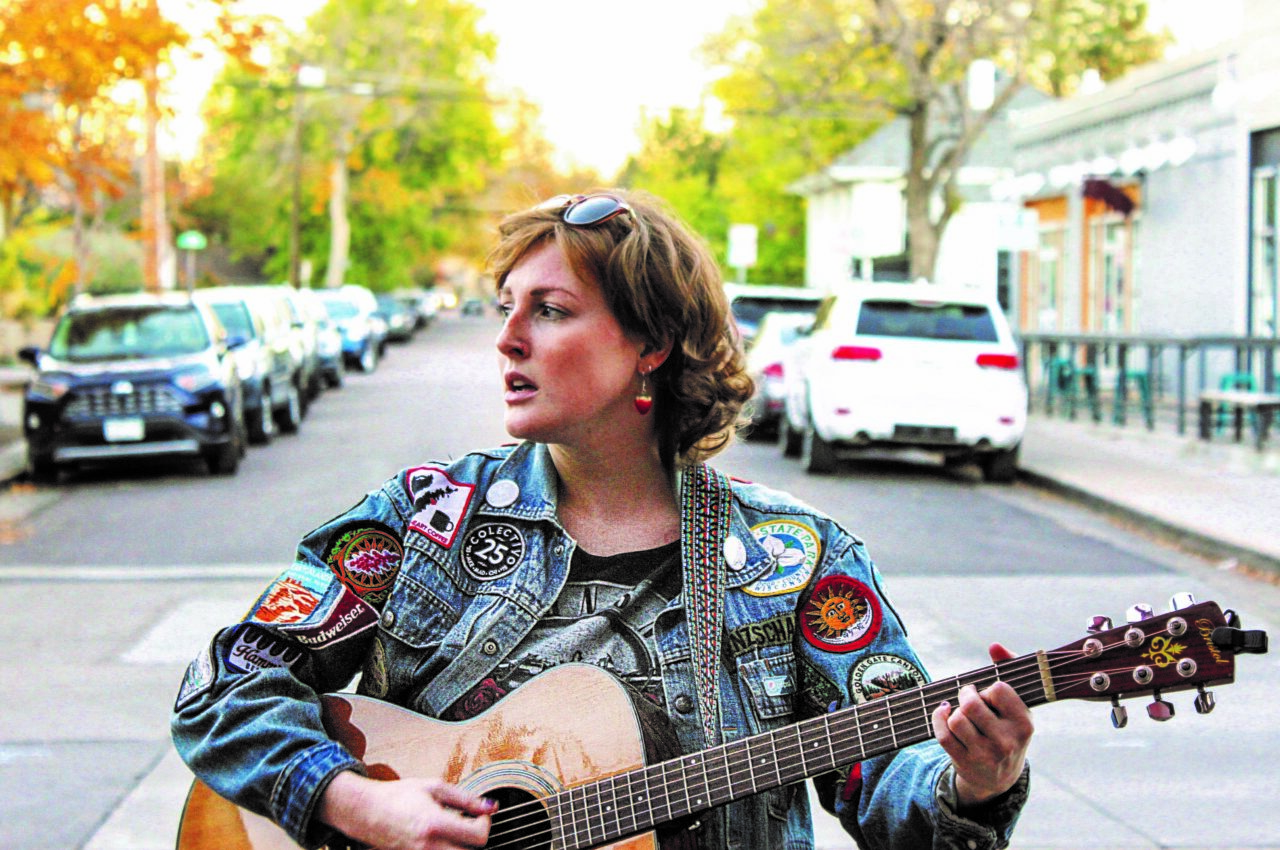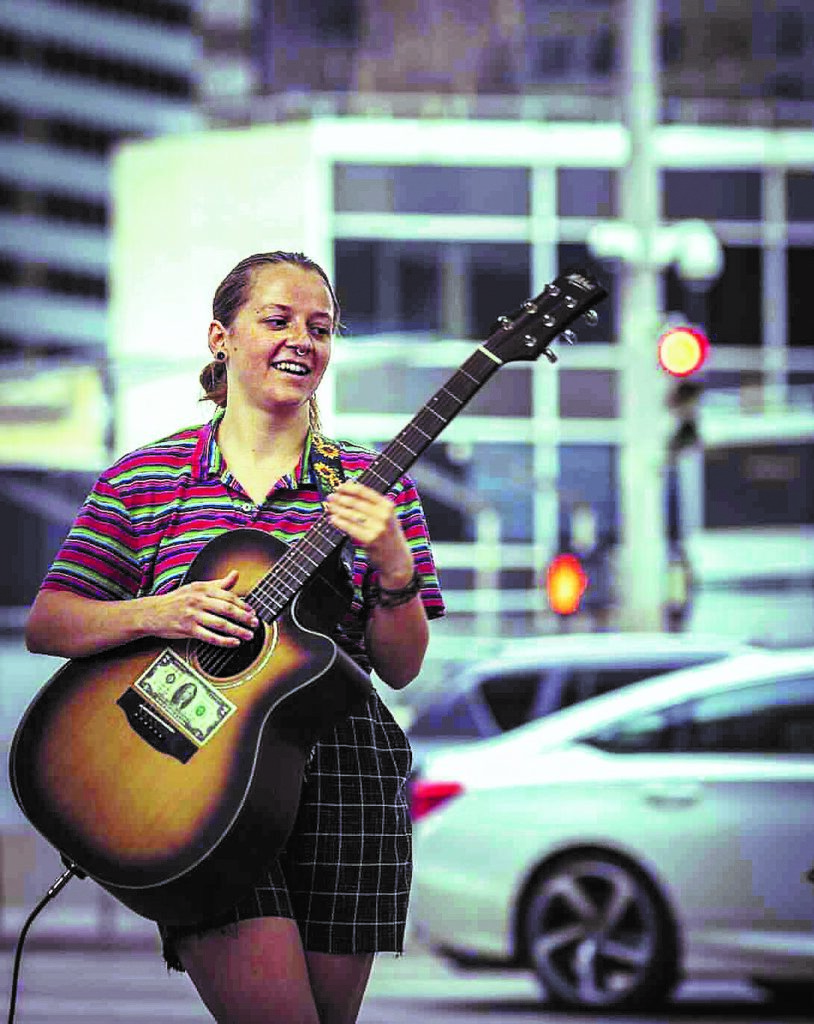Busking: Building Confidence through Music

The first time I ever saw a street performer, besides at an amusement park or a place like Disney, was in Madison, Wisconsin, on a night out in college. A young guy was playing guitar and singing popular songs I knew – and he was good. But of course, our motive was to get to the next bar so we didn’t stick around to truly appreciate his music.
As a musician myself, I never forgot him. I was impressed that he had the guts to set up outside of one of the most “college” bars in Madison – State Street Brats – and play music to a bunch of tipsy students who likely had no problem being brutally honest.
Even though I’d already been performing professionally for years at that point, I never tried street performing, or “busking,” as it’s commonly called. I was nervous that I wouldn’t have enough memorized material or that I’d need a permit or license. I never did the research either. At the end of the day, I was too shy to try something new.
Until now – years later and in a new state.
When COVID restrictions began lifting in Denver and the city started to come alive again, I started to notice buskers performing at places like 16th Street Mall and on South Broadway. In North Denver, buskers are known to frequent Tennyson Street for First Fridays, one of Denver’s oldest art walks.
I had heard a lot about 16th Street Mall and even Pearl Street in Boulder, but there seemed to be an untapped market for busking in some of the hotspots in North Denver like Sloan’s Lake, 32nd Avenue, Highlands Square and LoHi.
But overall, Denver seemed really open to busking which is something I’d never experienced before. I began to reconsider the idea.
I had also met a fellow musician at a Mercury Cafe open mic named Sara Conwell who further reinspired an interest in busking. Seeing another female musician my age street performing made it seem like an attainable goal.

Conwell, who goes by Sara Flows, grew up in the suburbs of Chicago and was exposed to busking at an early age while she was in the city. It wasn’t until early this summer that she too saw busking as something she could try.
She gave it her first shot at the Pearl Street Mall in Boulder, which is known as one of the best spots to busk and street perform in Colorado. She brought her partner along for a boost of confidence and played for about an hour.
The experience made Conwell want to keep doing it, but her partner was moving to Oregon for work. Luckily Conwell came across an event called Busk It Baby, which was an organized, public busking event that would allow her to keep doing it with people.
“It was ridiculously inspiring,” Conwell said. “I feel like I learned a lot, I felt super comfortable.”
Busking can be a major confidence booster and give musicians tons of experience and practice. If you’re playing organized gigs, busking allows you to practice your songs back to back with the similar, added pressure of people watching.
“It builds a lot of confidence just to sing in a microphone on the street – not everyone does that,” Conwell said.
Busking is not always what you want it to be, though. Conwell felt like a lot of the time people didn’t care to pay attention or watch. But that made the moments when people did stop to listen that much more special.
Before she went out initially, Conwell did some quick research as to whether or not buskers needed a permit to perform. According to Eric Escudero, Director of Communications at the City and County of Denver department of Excise and Licenses, buskers do not need a permit or license to perform.
“Buskers are not something we are asked about often. In fact, this is only the second time in the almost four years I have been working for the city that I have been asked about this subject,” Escudero said. “We know a lot of people enjoy street musicians and it can add ambiance to some people’s shopping or dining experience. Even though there is no license required for busking in Denver, there are regulations in place that limit noise levels and where buskers can perform on Denver streets and sidewalks.”
Buskers performing on 16th Street Mall must follow several rules (found in the Public Works Rules and Regulations: Vending on the 16th Street Pedestrian and Transit Mall): they may not play in one spot for more than one hour, block an entrance to a building or reduce pedestrian right-of-way. They also may not allow their crowd to reduce pedestrian right-of-way, use amplification (or exceed sounds levels of 60 megahertz), interfere with special events, or leave any items in the middle of the sidewalk. They also must pick a side of the sidewalk to perform on and they or their audience may not block a merchant’s display window. Buskers may accept tips for their performances but not beg for them, they must distance themselves from other performers, and they must pick up after themselves and their audience.
The mall is overseen by the Denver Downtown Partnership, which enforces rules around busking, Escudero said.
Outside of 16th Street, there are no regulations in the City of Denver that address busking specifically, Escudero said. The two main things to be wary of are right-of-way rules (blocking sidewalks) and the noise ordinance. Sound may not exceed 75 decibels from 7am-10pm and no more than 70 decibels from 10pm-7am.
Now that I had all of the information in place, it was time to try busking for myself, alone.
On Friday night, Oct. 29, I went to Tennyson Street with my wagon full of mics, a mic stand, an amp and my guitar (and my boyfriend tagged along so I wouldn’t have to be completely alone). Friends of mine have played with amplification before and didn’t experience any trouble. After surveying the area first and finding there were no visible outlets, I decided to play acoustically.
I picked a spot that was getting a bit of foot traffic – in between Compass Glass Co., which was closed, and High Point Creamery. There was a band playing down the street at Tres Chiles Mexican Grill so I wanted to be courteous and give them their space.
And then I played.
Conwell was right – busking is an extremely humbling experience. I felt like most passersby were uninterested in the music I was playing, which was a mix of covers and originals. But I’ve tried to keep in mind that their disinterest could have nothing to do with my talent, like the fact that it was only about 6pm and they could be leaving work or getting to a dinner reservation, that they didn’t want to feel pressured to give me money, that they are shy about interacting with performers, etc.
Similarly, we figured out that playing acoustically meant that folks could only hear me well when they were standing in the bubble right in front of me, and the area I chose didn’t have a lot of space to stop and listen.
Busking also includes a lot of distractions that you need to be able to tune out. In the reflection of the window I was facing I could see two people dressed as cows crossing the street. Cars passing by were really loud. There was a group of people who had come out of the creamery and were talking and laughing fairly loudly for 10 minutes next to where I was performing, which I found slightly rude.
Overall I felt pretty discouraged about my first solo busking experience. I played for about 45 minutes and only earned $2. But that’s not to say that I wouldn’t do it again. It’s important to try a few different spots and remain resilient – there are a lot of people who can make good money street performing and I’m confident I can be one of them someday.
In the end, though, it’s not about the money – it’s about the music.
If you’d like to check out their music, Sara Conwell can be found on Instagram at @sara_flows and Celeste Benzschawel can be found at @noidontlikeedsheeran.

Be the first to comment